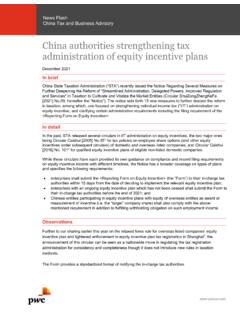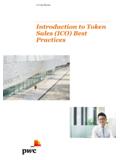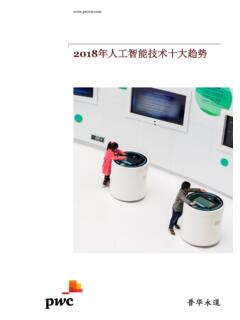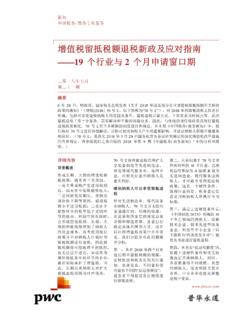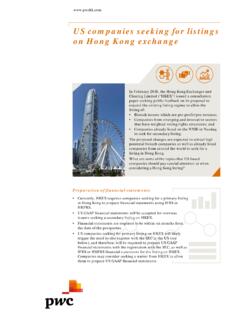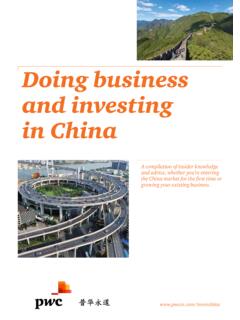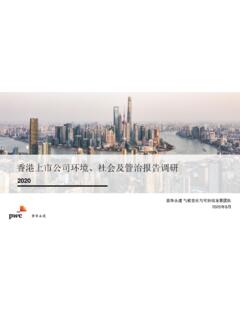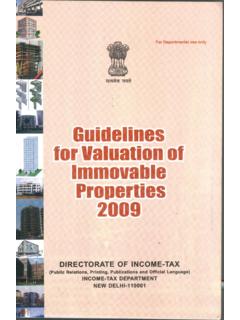Transcription of The long-awaited DIPN on tax exemption for …
1 FinancialServices TaxNews FlashThe long - awaited DIPN on taxexemption for offshore private equityfunds still leaves some issues to beaddressed2 June 2016In briefThe InlandRevenue Department (IRD) issued Departmental Interpretation and Practice NotesNo. 51(DIPN 51) on 31 May 2016 setting out its views on various issues relating to the applicationof the offshore privateequity fund tax exemption regime. DIPN 43 was also revised at the sametime to reflect the IRD s latest interpretation and practice relating tothe offshore fund taxexemption regime as awhole. While there is now clarity on some issues, some challenges andunanswered offshore fund profits tax exemption regime has been extended with effect from 1 April 2015whereby offshore private equity funds and their special purpose vehicles (SPVs) will be exemptfrom Hong Kong profits tax if the relevant requirements are 51 and revised DIPN 43 set out the IRD s views on a number of issues that are the subject ofdebate under the extended as well as the original tax exemption / unanswered IRD s stancePwC s comment1.
2 Interest incomeThe IRD wishes to end the long debate on the treatment ofinterest income under the original offshore fund tax exemptionregime. Paragraph 24 of DIPN 43 explicitly states that theholding of debentures, loan stocks, bonds or notes to earn interest income is not a transaction in securities since suchholding does not involve two transacting parties and cannot beregarded as a transaction. The interest derived therefrom couldonly be considered as derived from incidental transactions andnot specified transactions. The consequence is that interest income, if Hong Kong sourced,would be subject to the 5% threshold for incidental transactions,which if exceeded, would render the fund being subject to tax onthe relevant income from all incidental interpretation of theIRD, which may be subjectto challenge, will affectinvestment funds thatinvest in debt securities, inparticular fixed incomefunds and private equityfunds investing inconvertible bonds orsimilar instruments.
3 Suchinvestment funds shouldreview their situation andseek further advice on howthis issue should Qualifying fundsDIPN 51, paragraph 40 indicates that for the purposes ofdetermining whether a private equity fund is a qualifying fund ,it would not be inappropriate to see through the feeder fundswhen counting the number of investors of the private equityfund as feeder funds are often vehicles to account for the needsof the investors and may not have independent existence oftheir own. The IRD will examine the totality of facts includingthe constitutive documents to determine whether it isappropriate to see through the feeder remains to be seen howthis would be implementedin practice, in particularunder what circumstancesthe feeder funds would beconsidered as not having independent existence oftheir own.
4 The IRD s stancePwC s comment3. SPV activitiesAn SPV, as defined in the legislation, is not allowed to carry on anytrade or activities other than for the purpose of holding, directly orindirectly, and administering one or more excepted privatecompanies (EPCs). In this regard, DIPN 51, paragraph 47, states thatthe SPV: should not engage in an active business with buying and sellingtransaction ( trading transactions); cannot derive service fees from the offshore fund; is expected to only derive passive dividend income from one ormore EPCs; is to hold and administer EPCs in the capacity as a shareholder orholder of participation or equity interest; cannot engage in the management of the business of the EPCs;and can only perform the following activities: reviewing financialstatements of EPCs normally made available to shareholders orinvestors; attending the shareholders meetings of EPCs; openingbank accounts for collection of dividends or investment receipts.
5 And appointing company secretary and terms of the tax residence of an SPV, paragraph 81 states that indeciding whether a tax residence certificate can be issued to an SPV,factors such as whether the SPV has a permanent office or employsstaff in Hong Kong will be examined to determine whether it hassubstantial business activities in Hong Kong. In particular, the IRDwill refuse to issue a tax residence certificate if the SPV is a very limited scope of activities that anSPV can perform may pose challenges forprivate equity funds trying to enjoy taxtreaty benefits since there are increasingrequirements on the level of substance maintained by an SPV as required by taxauthorities around the world, in particularthe IPODIPN 51, paragraph 53, states that if an offshore private equity fund sells its investment in an EPC through an initial public offering( IPO ), it is in substance no different from a transaction in listedsecurities or a transaction in securities of an EPC.
6 As such, theprivate equity fund will continue to be eligible for profits taxexemption of the divestment if the other specified conditions not explicitly stated, it shouldimply that the disposal of listed securitiesby an SPV through IPO should be insubstance no different from a transactionin securities of an EPC and thus eligible forprofits tax exemption (since an SPV isallowed to invest in an EPC). However, asmentioned in item 3 above, the SPV shouldnote that it should not engage in thebuying and selling of the listed shares afterthe TaintingThe IRD has made it very clear (DIPN 51, paragraph 54 refers) thatwhere an offshore private equity fund carries on any business inHong Kong other than the specified transactions and incidentaltransactions, such other business will taint the fund and the fund willlose its tax exemption status for all its equity funds as well as hedge fundswith private investments need to reviewtheir situation and assess how thispotential issue should be managed Services Tax News Flash2 Financial Services Tax News FlashThe IRD s stancePwC s comment6.
7 Bona fide widely heldFor the purposes of determining whether an offshore private equityfund will be regarded as bona fide widely held such that thedeeming provision will not apply, the IRD indicates that the bonafide widely held test applies to all offshore funds though privateequity funds by their nature are unlikely to be widely held .This implies that the usual benchmarkfigures of no fewer than 50 investors and no fewer than 21 persons holding 75% ormore of the fund will equally apply toprivate equity funds. If an offshore privateequity fund fails to meet these benchmarkfigures, it will be regarded as bona fidewidely held only if the IRD is satisfied thatthe fund was established with a view towide public participation and genuineefforts are being taken with the aim ofachieving that objective. This probably is anassessment to be made on a case-by-casebasis by taking into consideration therelevant facts and circumstances of thefund and the relevant Carried interestDIPN 51 includes a section on taxation of investment manager.
8 Inthat section, the IRD states for the first time in a DIPN its views onthe taxation of carried interest / performance fees received by fundinvestment managers. The key messages are: Investment managers and advisors should be adequatelyremunerated for their services on an arm s length basis; Management and performance fees based on a cost-plus formulaare not likely to have been determined on the arm s length basis,in particular when the investment managers or advisorsperformed significant functions and bore considerable risks inHong Kong to generate the profits of the offshore fund; For a private equity fund that is a limited partnership,distributions (unless comparable to the return arising oninvestments made by external investors in the fund) received bythe general partner may be attributed under the general anti-avoidance provisions (GAAR) to the investment manager oradvisor as profits derived from services rendered in Hong Kong.
9 The place where Hong Kong investment managers or advisorsrendered their services will further be examined before decidingthe extent to which the management fees or carried interestattributable to the Hong Kong investment managers or advisorsshould be charged to profits tax. That is, whether the arm slength management fees or carried interest should be whollyassessable; and Distributions (unless comparable to the return arising oninvestments made by external investors in the fund) from ageneral partner limited partnership or a carried interest limitedpartnership to fund executives of the investment manager oradvisor may be chargeable to salaries tax as employment incomeor profits tax as services income through applying the GAAR ifthe distributions are not genuine investment or not carried interest should betaxable in Hong Kong is controversial andhas been subject to debate.
10 In the absenceof consensus on the matter, using GAAR toseek to tax carried interest may be subjectto challenge since investment managersmay argue that carried interestarrangements in the market is acommercial DIPN 51 and revised DIPN 43 provide clarity on a number of issues, some issues remain to be order to manage the Hong Kong profits tax position and increase the likelihood of being eligible for the benefitsunder the Hong Kong tax treaties, investment funds need to carefully plan their holding and operational s talkFor a deeper discussion of how this issue might affect your business, please contact your usual PwC contact or one ofthe following:David KanTax Partner+852 2289 Mak**Tax Partner+852 2289 LauTax Director+852 2289 McDonaldTax Partner (Transfer Pricing)+852 2289 Ho**Tax Partner+852 2289 Khoon LeeTax Director+852 2289 Yip*Tax Partner+852 2289 LeungTax Director+852 2289 SmithTax Senior Advisor+852 2289 Pacific Financial Services and Asset & Wealth Management Tax Leader & China/Hong Kong Financial Services Tax Leader**China/Hong Kong Financial Services Transfer Pricing Leader**Asia Pacific Banking & Capital Markets Leader, Hong Kong Financial Services Tax LeaderThis content is for general information purposes only, and should not be used as a substitute for consultation with professional advisors.
